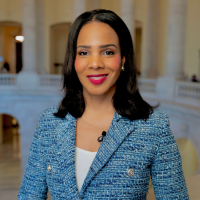President-Elect Trump Fills Top Roles as Republicans Set to Win Senate and House
Just three days after Election Day, the transition is already underway for President-elect Donald Trump's second term.
The new administration is moving swiftly to fill top roles, while Republicans are on track to take control of both chambers of Congress.
After securing his historic second White House term as the 47th president, Trump's team is looking ahead to day-one priorities, including carrying out his campaign promise to deport an estimated 12 million undocumented immigrants and rescind any of the Biden's administration policies that expanded opportunities for migrants to live and work in the U.S.
The President-elect is also already starting to fill out his administration.
New York Congresswoman Elise Stefanik is said to be the administration's top candidate for U.S. Ambassador to the United Nations.
However, no official decision has been made.
Women are among the first names to fill administration roles including the appointment of Susie Wiles. Trump's campaign manager will serve as the White House Chief of Staff.
Wiles, the daughter of football legend Pat Summerall, is the first woman to hold the influential role.
There's quite the shake-up in Washington D.C., from the Oval Office to Capitol Hill.
The latest election results appear to put House and Senate Republicans on track to control both chambers of Congress next year.
The GOP carrying the Senate with 53 seats following a major upset out of Pennsylvania.
Republican David McCormick flipped Democratic incumbent Bob Casey's seat.
Like Trump and Republicans across the map, McCormick significantly erased Democratic support.
Meanwhile, lawmakers in other states are prepared to challenge the new Trump administration.
"As attorney general, I will continue to use the full force of the law, the full authority of my office to address injustice, to stand up for all people, especially those who have been long overlooked and undervalued, to safeguard reproductive rights," said Rob Banta, California's Attorney General.
California Governor Gavin Newsom echoed the Attorney General calling for a special session of the state legislature to help fund potential legal challenges to Trump policies affecting women's rights, immigration, and climate.
The governors of Illinois and New York are making similar pledges to defend their states against Trump's second-term policies they deem harmful.
The president-elect's new mass deportation plan, according to some estimates, could cost upwards of $88 billion a year.
Mr. Trump dismissed those price concerns in an interview with NBC News saying, "There is no price tag to safety."




